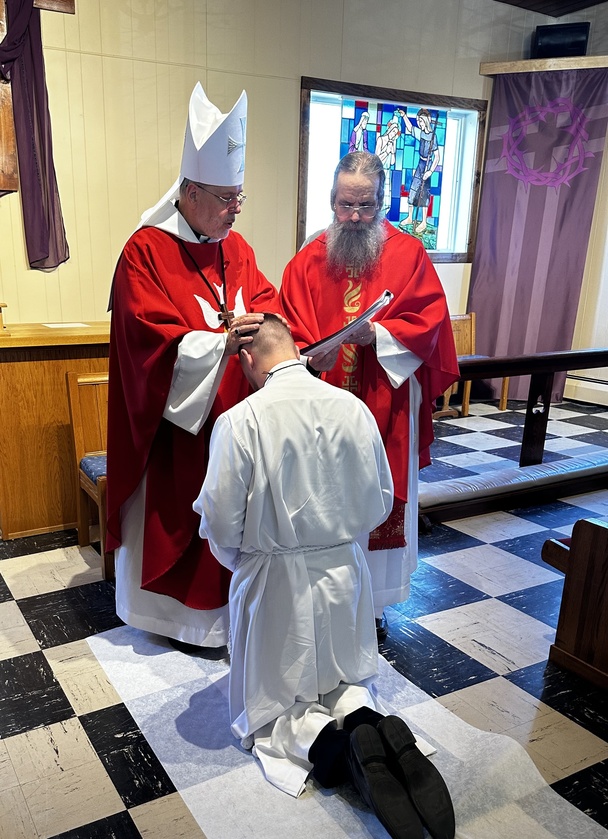
In the name of the Father, the Son, and the Holy Spirit.
Yesterday, over our Maundy Thursday meal, Fr. Chandler spoke to the reality that the cross of Christ is, in a real sense, the glory of God revealed. I want to spend a few minutes fleshing that out. Often times, we have the tendency to see the cross as a necessary step towards Christ’s glorification, but we fail to fully grasp that the cross is truly a part of Christ’s glorification. We recognize the resurrection and ascension of Jesus as his glorification, but sometimes fail to include the cross—a bloody Roman execution—in the word “glorification.” How could something so evil be joined to something as marvelous as “glory?”
To answer this question, I’d like to focus on the Gospel of John, and in particular, I’d like us to look, together, at the word “hour,” in particular, Christ Jesus’ hour, which appears throughout the Gospel of John.
It is in this phase that we begin to understand the magnitude of what the cross accomplishes and how something as gruesome can also be something glorious.
The first thing to take note of is that throughout the first 11 chapters of John, the hour is spoken of as something not yet. For example, when Jesus is told that there is no more wine at the wedding of Cana, he responds in John 2:4 by saying “my hour has not yet come.” When the teachers of the law seek to arrest Christ, we are told in both John 7:30 and John 8:20 that they could not arrest him, because his hour had not yet come. Jesus himself speaks of “the hour [that] is coming” to the Samaritan woman and to a group of Jews. Thus, for the first part of Christ’s ministry, the hour is still something that is coming. However, as we turn into John 12, the hour becomes present tense. Most notably, the hour becomes immediately associated with the glorification of the Son.
In John 12:23 we hear Jesus say: “The hour has come for the Son of Man to be glorified.”
The next question we should be asking is “what changed?” What suddenly made the hour that was coming, the hour that now is?
Roman Catholic theologian Scott Hahn is immensely helpful here as he pieces together the contextual clues woven seamlessly by John throughout the Gospel.
The very first time we read about “the hour” it is at a wedding when Jesus is told that there is no more wine. Dr. Hahn points out that it is very strange to respond to the announcement that there is no more wine by saying “my hour has not yet come.” The conclusion that must be drawn from this is that somehow the providing of wine must somehow be associated with “the hour.”
Dr. Hahn goes on to note that the very first time that Jesus declares that “the hour has come for the Son of Man to be glorified” he also says, “Truly, truly, I say to you, unless a grain of wheat falls into the earth and dies, it remains alone; but if it dies, it bears much fruit.” (Jn 12:24.) In other words, Jesus is associating his glorification with his death—like a grain of wheat that falls into the earth. However, this grain of wheat is said to bear fruit. Dr. Hahn then poses a question: what is the fruit of a grain of wheat? The answer is BREAD.
The only conclusion that can be drawn from these two passages is that somehow the hour that Jesus is referring to—the hour that is his glory—involves both bread and wine.
In John chapter 13—the very chapter after Christ announces that the hour of his glorification had come, we see the gathering around the table—the very table around which the Holy Eucharist was instituted.
On that night, Jesus took bread and Jesus took wine, and blessing them both he made them to be efficacious symbols of his broken body and his spilled blood. The only time that body and blood are spoken of separately is when there has been a death. And on that same night our Lord was betrayed, placed on trial, beaten, mocked, given a crown of thorns, nailed to a cross, and hung until he died. Our Lord’s body and blood were separated this night. This is the hour of his glory.
But friends, what is glorious about bread and wine becoming symbols of a bloody Roman execution? How can this be “the hour” of glory?
In John 13:1, right before the Supper where Christ institutes the Eucharist, we read this: Now before the Feast of the Passover, when Jesus knew that his hour had come to depart out of this world to the Father, having loved his own who were in the world, he loved them to the end. (Jn 13:1.)
I want us to focus on the final words of that verse: Jesus loved his own to the end. Love. In one word, this is the glory of the cross. Love.
In John 12:32-33 Jesus says, “And I, when I am lifted up from the earth, will draw all people to myself.” We might assume that “lifted up from the earth” implies his ascension, but right after he says this, John writes: “He said this to show by what kind of death he was going to die.” Thus, Jesus associated his death with the drawing of all people to himself. Again, this is love.
On this point of love, St. Francis de Sales writes: “Mount Calvary is the mount of lovers. All love that does not take its origin from the Savior’s passion is foolish and perilous. Unhappy is love without the Savior’s death. Love and death are so mingled in the Savior’s passion that we cannot have one in our hearts without the other. Upon Calvary, we cannot have life without love, or love without the Redeemer’s death.” – St. Francis de Sales
Therefore, as Jesus proclaimed the glory of his hour—the revelation of this glory was the cross—because on the cross humanity can look upon and see the immeasurable love of God for mankind. On that cross, Christ bore the sins of the world, that by his blood, the world might become the righteousness of God.
When Jesus was told that there was no wine at the wedding, and his response was to say, “my hour has not yet come,” we must also recognize that his hour pointed towards a greater wedding feast, a wedding that the bread and wine of the Eucharist unite us to. It is a wedding reality that we step into each week when we come to the table. Jesus says, “I am yours and you are mine.” And this feast, this wedding, this love, is impossible apart from the separation of Christ’s body and blood.
So tonight, we remember the cross in solemnity. But we do not remember it without joy, for on that cross the greatest act of love was made and the marriage was consummated.
The cry of Psalm 22:1 “My God My God why have you forsaken me” ends in Psalm 22:31 with they [the nations] shall come and proclaim his righteousness to a people yet unborn, that he has done it.
In the name of the Father, and the Son, and the Holy Spirit.
Amen.
This is the first video reflection for the Great Fast.
Welcome to the Mere Catholicity Locals Community! Here, you will find like-minded Christians with a desire to live ecumenically and pursue Christ in all things.
The Mere Catholicity movement runs only through listener support. The work that I (Jonah) do requires time and money. Without the financial support of my Locals community, I would not be able to continue making content. Simple as that. It is only thanks to this group that I can continue providing you with content that (hopefully) both edifies and challenges!
The good news for you is that joining the community itself is completely FREE! Once you sign up, you will be able to see most posts, live streams, and even content posted by other users. However, you will only be able to observe. You will not be able to comment, post, or see any exclusive content. This might be a good way to see if you want to support later down the line. So please join! Even if you cannot afford to give at this time!
Now, for those who do wish to give ...
Friends - as I consider the various platforms that I operate, I find Substack to the most conducive to the model of online ministry that I am aiming for. Though I still plan to post here, as many of you still support me through this platform, Substack is where I will be focusing the majority of my time. If some of you wish to move your subscription from here to Substack, you are welcome to do that. Those who continue to support here, I will continue to post here — mostly the stuff that is behind the paywall on Substack so that you are getting the exclusive content regardless of where you are subscribed.
Hope you all are doing well. Lord bless you.
- Rev. Jonah
I've been gone again for a time preparing for my ordination. I was ordained a Deacon in the Holy Catholic Church on March 8th, 2025.
It was a joy beyond words. I am now back in full swing with ministry, media, and work.
I hope you all have been doing well. More to come soon.

Good morning everyone. I wanted to quickly update you on the Mere Catholicity Podcast. I’ve been posting videos on my channel, but it has been quite sometime since my channel has had a podcast episode release.
With my new job as a classical teacher, scheduling interviews has been a challenge. However, my plan is to use my summer breaks as time to double down on planning and recording new podcasts. The idea will be to record a ton of interviews that will then slowly release throughout the school year, expiring around the time the following summer arrives. This will ultimately result in a consistent once a month interview.
All that to say, the podcast will resume here in May or June of 2025 with some excellent interviews lined up!
Blessings on your Sunday!












